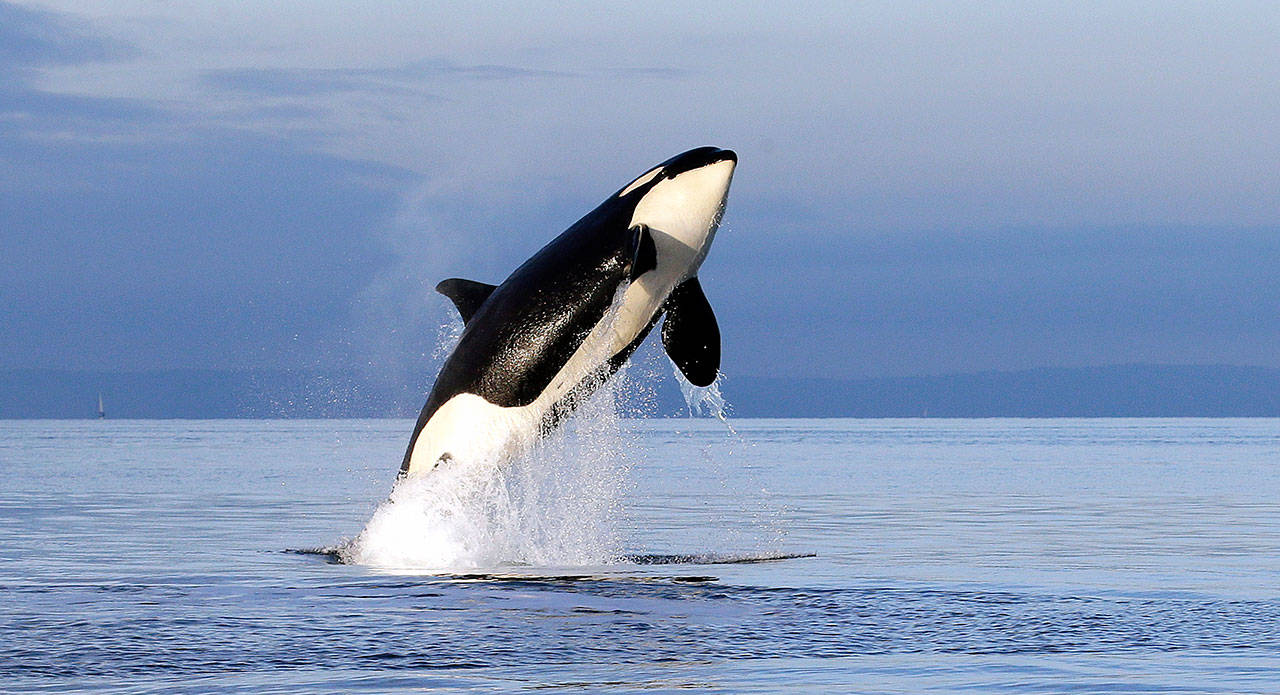By Phuong Le
The Associated Press
SEATTLE — With the number of endangered southern resident orcas at a 30-year low, Gov. Jay Inslee on Wednesday signed an executive order directing state agencies to take immediate and longer-term steps to protect the struggling whales.
The fish-eating mammals, also known as killer whales, that spend time in the water around Port Townsend and other areas of the Strait of Juan de Fuca and Puget Sound, have struggled for years because of lack of food, pollution, noise and disturbances from vessel traffic.
There are now just 76, down from 98 in 1995.
Inslee said the orcas are in trouble and called on everyone in the state to do their part. His directive aims to make more salmon available to the whales, give them more space and quieter waters, make sure they have clean water to swim in and protect them from potential oil spills.
“The destiny of salmon and orca and we humans are intertwined,” the governor said at a news conference at the Daybreak Star Cultural Center in Seattle.
“As the orca go, so go we.”
An orca task force forming now will meet for the first time next month and will come up with a final report with recommendations by November.
“This is a wake-up call,” said Suquamish Tribal Chairman Leonard Forsman, adding, “It’s going to take some pain. We’re going to have to make some sacrifices.”
Many people have been sounding the alarm about the plight of the closely-tracked southern resident orcas for years. The federal government listed the orcas as endangered in 2005, and more recently identified them as among the most at risk of extinction in the near future.
A baby orca has not been born in the past few years. Half of the calves born during a celebrated baby boom in 2015 have died. Female orcas are also having pregnancy problems linked to nutritional stress brought on by a low supply of chinook salmon, the whales’ preferred food, a recent study found.
“We are not too late,” said Barry Thom, west coast regional administrator for NOAA Fisheries. “From a biology perspective, there are still enough breeding animals, but we need to act soon.”
Whale advocates welcomed the statewide initiative, saying it creates urgency and calls attention to the issue. But some also said it was long overdue.
“I think that everybody would have loved to have seen this five years ago,” said Joe Gaydos, science director for the SeaDoc Society. “It is a crisis. The fact that we’re responding is good.”
Under the order, state agencies will find ways to quiet state ferries around the whales, train more commercial whale-watching boats to help respond to oil spills and adjust fishing regulations to protect key areas and fish runs for orcas.
Orcas use clicks, calls and other sounds to navigate, communicate and forage mainly for salmon. Noise from vessels can interfere with that.
The Legislature passed a supplemental budget Friday that includes $1.5 million for efforts such as increased marine patrols to see that boats keep their distance from the orcas and to boost hatchery production of salmon that the orcas prefer to eat by an additional five million.
Last year, the endangered orcas spent the fewest number of days in the central Salish Sea in four decades, mostly because there wasn’t enough salmon to eat, according to the Center for Whale Research, which keeps the whale census for the federal government.
“I applaud anything that helps [the orcas] through the short term, but the long term is what we really have to look at — and that’s the restoration of wild salmon stocks throughout Washington state,” Ken Balcomb, senior scientist with the Center for Whale Research, said Tuesday.
Balcomb and others say aggressive measures are needed and they have called for the removal of four dams on the Lower Snake River to restore those salmon runs.
J.T. Austin, the governor’s senior policy adviser on natural resources issues, said Inslee thus far does not support removing those dams.

